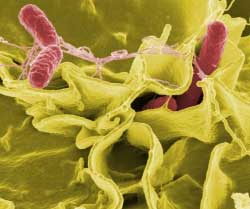



Researchers Investigate Egg Washing
AUSTRALIA - The search for effective egg washing techniques to improve the appearance of eggs and associated food safety is a key objective in a new Poultry CRC research project being conducted at the South Australian Research and Development Institute (SARDI).
A research scientist at SARDI's Food Safety Research Program, Dr Damian May, is working with the Project Leader, Dr Margaret Sexton, Technical Manager – Poultry Food Production at Biosecurity SA, according to the latest issue of e-Chook news. Dr May said that the key aims of the project are to identify and trial effective egg washing chemicals to improve the visual appearance, hygiene and safety of eggs.
In Australia, the vast majority of eggs are washed prior to packing to remove dirt and faecal material to reduce the microbial contamination of the egg shell. Eggs which are not visually clean after washing are frequently diverted for pasteurisation, along with cracked eggs, resulting in lower returns to the processor.
The washing process consists of several stages – pre-washing, washing with the aid of a surfactant / detergent, sanitising and blow-drying – and can take less than 30 seconds. Hence, the effectiveness of the surfactant's ability to penetrate and effectively remove dirt and faecal matter is critical for the recovery of table eggs. An effective detergent can also assist in the removal of bacteria while a suitable sanitiser, together with a clean post-wash processing environment, will assist in maintaining the hygienic status of the eggs.
Dr May explained: "If successful, this project will result in higher returns for processors due to less eggs being sent off for pasteurisation and a safer product for consumers. To date we have successfully developed a method for making 'dirty' eggs for trialling the different surfactant/sanitiser combinations and are currently in the process of developing a laboratory based egg washer for the coming trials."
Additional reductions in Salmonella contamination due to effective egg washing would further reduce the risk to consumers. Effective egg washing is also expected to improve the general microbiological status of eggs, as determined by Total Viable Counts (general hygiene indicator) and E. coli and Enterobacteriaceae (indicators of faecal contamination).
The primary beneficiaries of this research project will be members of the egg processing sector through improved recovery rates of table eggs. In addition, improvements in processing hygiene, post washing, may help maintain or improve the shelf-life and food safety of eggs. Consequently, consumers of table eggs will benefit as will the food service sector.








